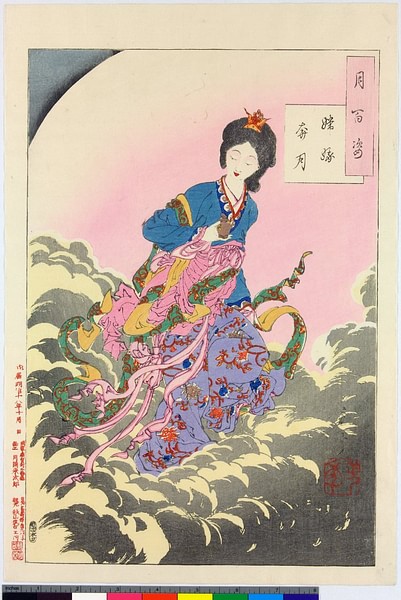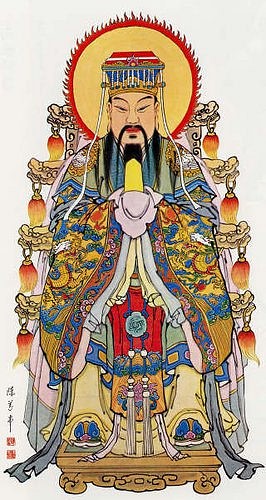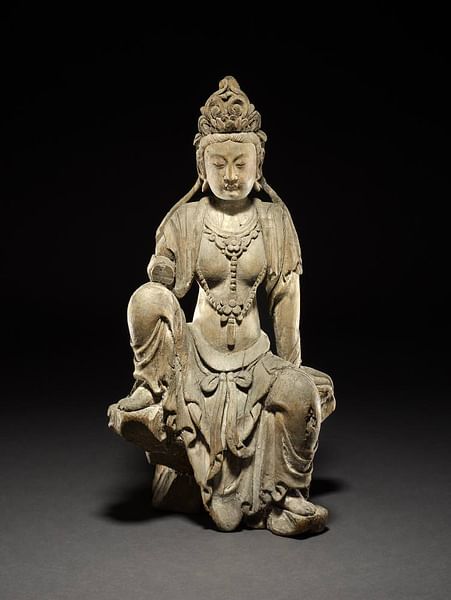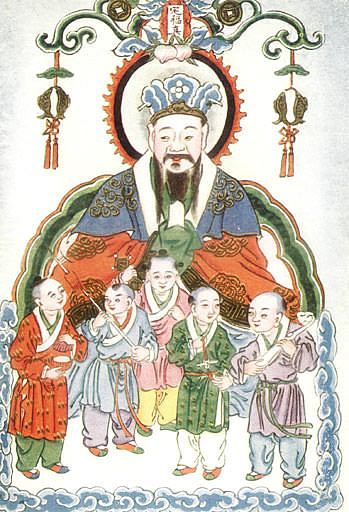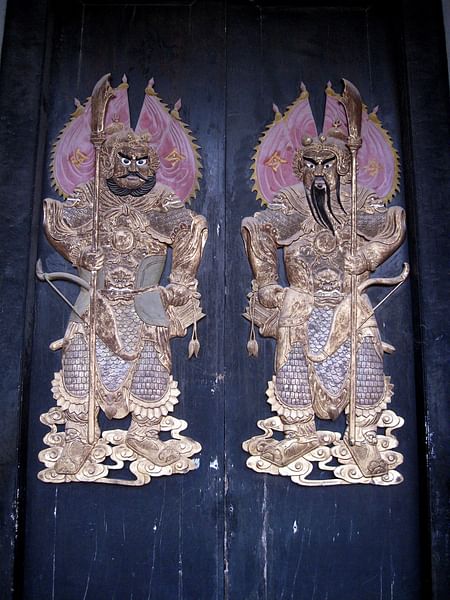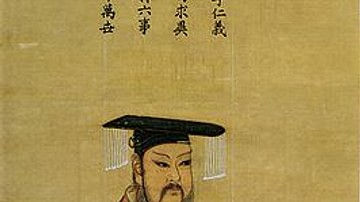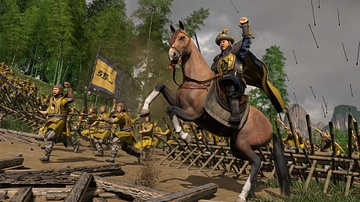There were over 200 gods and goddesses worshipped throughout ancient China, but if one were to count every deity or spirit, the number would be over 1,000. Each town, village, city, field, farm, and sometimes even separate plot in a graveyard, had its own Tudi Gong, an elemental earth spirit, who was recognized and honored.
There were also spirits known as Kuei-Shen, nature spirits, who might inhabit a tree or live by a stream or preside over a garden. These were eternal spirits who had never been mortal but others, known as guei (or kuei, gui, kui), had once been human beings who had died and passed on to the afterlife. The guei could return to haunt the living for various reasons, and rituals, spells, and religious practices developed to appease them.
There were also deities who had once been mortal and now lived with the gods, such as the Baxian (Pa Hsien), the Eight Immortals of holy Taoists who were rewarded by the goddess Queen Mother of the West with immortality. The Baxian were prayed to like any of the other gods, as were one's ancestors who had passed over the bridge between the land of the living and the realm of the dead to live among the gods and watch over the living.
The gods were believed to have created the world and human beings, and they kept the world and surrounding universe functioning. Each deity had his or her own special area of power and influence, and the most important were given their own shrines and temples, although shrines were also erected to local spirits and to noble men and women who became deified after death.
These deities lived in palaces and castles high above human beings in places like the Kunlun Mountains, Mount Tai, the Jade Mountain, and Mount Penglai which was the mystical island of the afterlife somewhere far out at sea. Even though they were far away, they were still connected to human life on a daily basis, watching over and keeping account of the good and bad deeds people did. Each of the deities had their own part to play in the lives of people and the operation of the world from the most intimate moments to events of national importance such as a dynasty's collapse.
All of the gods, goddesses, and spirits were important to the people of ancient China, and remain so today, and selecting a certain small group leaves out many, many others who remain just as significant. However, one can single out those deities who had national prominence, are among the oldest, or are without question the most popular as shown through ancient writings and evidence from archaeological excavations.
The gods and goddesses listed below are given in the order they appear in Chinese writings. Most likely, deities like Nuwa, Fuxi, and P'an Ku were recognized much earlier than written records indicate, and the same is probably true of most of the gods and goddesses on the list. These deities are selected because they were all very important to the people of ancient China even though some were more prominent at certain times in history than at others.
Dragon
The dragon is the oldest symbol of a deity found in China. The dragon symbol appears on pottery found at the Neolithic site of Banpo Village dating from between c. 4500-3750 BCE. Dragon was considered a composite of yin and yang energies and was originally seen as a balancing force who was wise and just. The dragon Yinglong was known as The Dragon King and god of rain and waters. As god of the sea, he was known as Hong Shen and was prayed to regularly by sailors and fishermen, but farmers who needed rain for their crops worshipped Dragon as well. He is also shown in human form as a wise man with the full sun behind his head watching over a boat full of people.
Shangti
Shangti was the supreme god of law, order, justice, and creation. He is also known as Jade Emperor, Yellow Emperor, or Yu Huang Shang-Ti, although there are sometimes important distinctions made between these names and Jade Emperor can mean another deity. Shangti was considered the great ancestor of all Chinese, who gave the people culture, architecture, skill in battle, agriculture, controlled the weather, regulated the seasons, and was king over the other gods, human beings, and nature. He was worshipped primarily during the Shang Dynasty (1600-1046 BCE) when he was considered a deified king who ruled c. 2697-2597 BCE and was included in the mythical or semi-mythical grouping of the Three Sovereigns and Five Emperors, demi-gods who ruled China between c. 2852-2070 BCE. During the Zhou Dynasty (c. 1046-226 BCE) Shangti was replaced by the concept of Tian (Heaven) but re-emerged as Shangti during the Warring States Period (476-221 BCE). The Zhou developed the concept of the Mandate of Heaven which legitimized the rule of a certain dynasty. Tian judged who was worthy to rule and for how long, and when a dynasty was no longer fit, it fell and another took its place.
Queen Mother of the West
She was the queen of the immortal gods and spirits, especially female spirits who lived in the mystical land of Xihua ("West Flower"), and goddess of immortality. She is also known as Xiwangmu or Xi-Wang-Mu and lived in a castle of gold in the Kunlun Mountains, surrounded by a moat which was so sensitive that even a hair dropped on the waters would sink. This moat served as protection for her Imperial Peach Orchard where the juices of the fruit of the trees gave immortality. Xiwangmu is shown as a beautiful woman with sharp teeth and a leopard's tail, or as an old, unattractive woman with a hunched back, tiger's teeth and a leopard's tail, depending on her mood. She rewarded her followers with eternal life but punished those who angered her. During the Han Dynasty (202 BCE-220 CE) her cult was very popular and shrines were built for her by the government. She is the wife of Mugong, Lord of the Spirits, who watches over male spirits in the land of Donghua ("East Flower") but is sometimes seen as the wife of Shangti.
Guanyin
Guanyin was the goddess of mercy and compassion who became the patron of sailors and fishermen. She was originally a deity in India known as Tara who was born of the tears of the bodhisattva Avalokitesvara (whose name means "One Who Gazes Down Upon the World and Hears the Cries of the People") and was seen as his female counterpart and a goddess of compassion, wisdom, and liberation. She came to China from India through trade via the Silk Road during the Han Dynasty. She was so compassionate that she incarnated as the maiden Miaoshan in order to experience life as a human being and offer service to others. Miaoshan's father wanted her to marry a wealthy priest. Miaoshan refused to marry unless the marriage could end the sufferings caused by illness, aging, and death. When her father told her no marriage could end such things, she replied that a doctor could, but her father did not want her marrying someone of such a lowly occupation.
She was allowed to enter a temple instead of marrying, but her father made sure that she was given all of the worst work, which she accomplished with the help of the nearby animals who responded to her goodness. Her father then tried to burn the temple down but Miaoshan put the fire out with her bare hands. He then had her executed, but when she went to hell, she released all of the goodness she held inside and turned it into paradise. The king of the dead, Lord Yama, sent her back to earth before she ruined his realm, and she lived afterwards on Fragrant Mountain where she watched over human beings. From her mountain home, she would often notice people in trouble on their boats at sea and rescued them, which is how she became patron goddess of sailors and fishermen. She was one of the most popular deities in all of China, and both men and women adored her.
Yan Wang
Yan Wang is the god of death and king in the afterlife. He is the greatest of all the Lords of Death who rule the regions of the underworld. He is also known as Yang-Wang-Yeh, Lord Yama, and Lord Yama King. Yan Wang presides over the judgment of souls and decides whether they will be punished for their crimes in life, go on to live with the gods, or be reincarnated. In one famous story, a soldier named Commandant Yang, who had caused a great deal of suffering and misery in his life, died and appeared in the court of Yan Wang.
Yan Wang asked him how he had managed to build up so many sins on his soul in the short time he was on earth. Yang claimed he was innocent and had done nothing wrong. Yan Wang commanded the scrolls of Yang's life to be brought in where the date and time of his sins were read along with who was affected and how many had died because of Yang's selfishness. Yang was condemned by the Lord of Death, and a great hand appeared which snatched him up and crushed him. It was said that one could escape punishment for one's sins on earth but no one could escape justice in the court of Yan Wang.
Nuwa & Fuxi
Nuwa and Fuxi were the mother and father deities of human beings. Nuwa was born at the beginning of creation and fixed the mistakes made at first so that everything was perfect. She built a palace for herself, which became the model for Chinese architecture, and lived there with her friend and brother Fuxi, both depicted as human-dragons with human heads and dragon bodies or human bodies to the waist and dragon legs and tails.
Nuwa became lonely and created human beings for company from the mud of the Yellow River. She breathed life into them and they moved and lived. She continued to make more and more human beings but it was tiring work and so she created marriage so that they could reproduce themselves. The humans were alive but had no knowledge of anything and so Fuxi gave them the gifts of fire, writing, how to get food from the sea, and all the other skills they would need to live. He also gave them the gifts of music, culture, and divination so they could make good decisions by knowing what the future held.
Caishen
Caishen, the god of wealth, was one of the most popular gods of ancient China and still is today. Statues of Caishen (also known as Ts'ai Shen) can be seen in businesses run by Chinese merchants all around the world and in Chinese homes. His statue shows a wealthy man seated in a silk robe holding riches in both hands. He is sometimes accompanied by two attendants carrying bowls of gold. He was not just the god of material wealth but of a rich life which meant a happy family and a secure, prosperous, and respectable job. Caishen was very generous to his followers but was not foolish and did not give out his wealth to just anyone. People had to prove themselves worthy of his generosity by working hard, praying to him regularly, and thanking him for his gifts. Temples and shrines to Caishen were probably the most numerous in ancient China.
Chang'e
Chang'e, the goddess of the moon, was another of the most popular deities in ancient China and is the most often mentioned deity in Chinese poetry and literature. She was the consort of the archer god Hou Yi who saved her during a lunar eclipse and brought her back safely. Chang'e betrayed him by stealing from him the elixir of immortality, which the gods had given him, and ran across the night sky with it, pursued by Hou Yi. She reached the moon where she transformed herself into a toad to hide from him until his rage passed. Hou Yi had been stopped in his pursuit by a hare who would not let him pass until he calmed down and promised he would not harm her. When Hou Yi reached the moon, Chang'e had remained in her toad form too long to change back and so, when one looks at the moon, one sees the outline of a toad on its surface. The story of Chang'e and Hou Yi was celebrated at the Mid-Autumn Festival in ancient China which is known today as the Moon Festival when people go outside at night to appreciate the moon, eat moon cakes, and give gifts to friends and family.
Zao-Shen
Zao-Shen (or Tsao Shen and Tsao Wang), also known as The Kitchen God, lived in the kitchen above the stove of every home. He was represented by a paper image made by the most prestigious woman of the household and was kept in the same place throughout the year. Zao-Shen was responsible for the happiness of the home and the prosperity of the family, but this depended on their behavior and values. Every month Zao-Shen left the home to report to the local gods and spirits on the family's conduct. If they had behaved well, he was instructed to increase their riches and happiness; if they had behaved badly, he was told to withdraw riches and happiness. "Riches" meant not only material wealth but comfort and well-being, which was further assured by his warding off evil spirits.
When he left the home to make his report, families were especially anxious because they had no household protector. At the end of the lunar year, on New Year's Eve, Zao-Shen had to leave to report to Shangti himself and the universal gods on how the family had behaved throughout the year. At this time, more incense was burned than usual in front of the paper statue and its mouth was smeared with honey so that only sweet words about the family would be reported to the gods. Offerings of fine foods and good wine were placed before him to thank him for his protection. The paper figure was then burned and firecrackers set off to speed him on his way. The next morning, the first day of the New Year, a new paper statue was made and placed above the stove.
Niu Lang & Zhi Nu
The god and goddess of love. Zhi Nu was the goddess of weaving for the gods and daughter of Shangti. Every day she wove the beautiful robes the gods wore and looked down on earth from her place among the stars and wished she could visit. She was finally granted permission by her father and went to earth where she left her clothes by the banks of a stream and went swimming. A cowherd named Niu Lang saw her and fell in love with her so he stole her clothes so she could not run away from him. When Zhi Nu came out of the water she was outraged that her clothes were gone but when Niu Lang explained himself she fell in love with him. She forgot all about her home in the heavens and her duties as divine weaver and stayed on earth with Niu Lang.
They were very happy together, every day they were more in love, and they had many children. Shangti was not pleased, though, and neither were the other gods and so soldiers were sent to bring Zhi Nu back home. Niu Lang tried to follow but Shangti threw a wall of stars across his path and stopped him; these stars are known on earth as the Milky Way. Once a year, magpies fly from earth to the Milky Way and form a bridge the two can cross to be with each other on the evening known as the Seventh Night of the Seventh Moon.
This became a very popular story referenced by writers and poets in many different eras of China's history. The Lady in the famous poem, Song of Everlasting Sorrow, references this story toward the end when she is on the island in the afterlife. The myth was the basis for the Festival of the Seventh Night of the Seventh Moon which officially was dedicated to women's art in sewing and weaving but unofficially was a night for romance. Zhi Nu is the star Vega in the constellation of Lyra, and Niu Lang is the star Altair in the constellation of Aquila, separated by the Milky Way except for once a year.
Menshen
Menshen, the guardians of the door, known as "Gods of Peaceful Sleep" who protect a room, house, or building from evil spirits and ghosts, originated in the early Tang Dynasty (618-901 CE). The emperor Taizong (r. 626-649 CE) was having a hard time sleeping because of nightmares. He consulted a doctor who blamed the bad dreams on evil spirits. Taizong's nightmares were so real he thought people were actually in the room trying to kill him, and so two of his most trusted guards were posted outside the door of his room, one standing on each side. Taizong began to sleep better with the guards outside and so ordered that their images be painted on the doorway. News of Taizong's painted soldiers spread and soon more and more people were painting guardians on their doors and rooms. These images can be seen on many buildings and homes in China and elsewhere. Part of the Chinese New Year celebration is cleaning and re-painting the Menshen on doorways.
P'an Ku
The god of creation, P'an Ku (also known as Pan Gu and Pangu) is pictured as a hairy dwarf with horns. Once there was only darkness everywhere in the universe and in this grew a cosmic egg which was kept warm for thousands of years until it broke open and P'an Ku appeared. He cut through the darkness and separated the yin from the yang principles; then he made the yin into earth and the yang into sky and pushed them apart from each other. Every day he stood on the earth and pushed the sky a little higher, and each day he grew taller and taller until he was a giant.
P'an Ku then began to add pretty details to his creation like mountains and valleys, which he made according to the principles of yin and yang so that everything would be balanced. He worked on his creation for thousands of years until it was perfect, and then he died. His breath became air and his blood the rivers and streams. The fleas from his body ran off and became animals while his body hair became forests of trees and bushes. His left eye became the sun and his right eye the moon. Many centuries after his death, Nuwa appeared and created human beings and Fuxi taught them how to survive in the world P'an Ku had created. In another version of the myth, human beings are the fleas which run from P'an Ku's body after he dies.
Other Gods & Goddesses
These gods and goddesses and many others were worshipped by the Chinese people for centuries. Some developed later than others but all were important to the people. There were many other notable gods who deserve mention: Guan Gong (also known as Guandi), the god of war, who was a great warrior and hero deified after his death; Sun Wukong, the god of mischief, who ate the peaches of immortality and tricked the gods into giving him eternal life; Fu-Shen, the god of happiness; Hou-Ji, god of Millet and grains; Kailushen, "Spirit Who Clears Roads", a protector against ghosts and evil spirits; Sheji, god of soil and grain, a harvest fertility god; Wen Chang (also known as Wendi), god of literature who was the patron of scholars and writers and kept accounts of how well writers used their talents in life; and Cheng Huang, "God of Wall and Moat" who protected the walls and gates of the cities. Although worship of these gods was outlawed as "superstition" when the communist party took control of the Chinese government in 1949 CE, they continued to be worshipped privately by the people and are still honored in many homes all over the world today.

